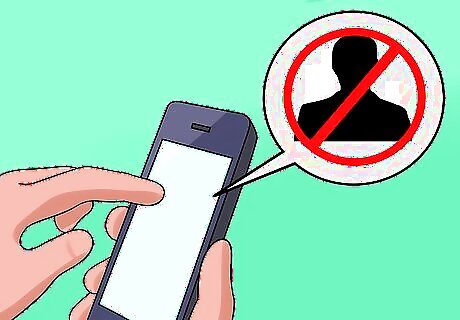
views
X
Trustworthy Source
StopBullying.gov
Website run by the U.S. Department of Health and Human Services providing information related to identifying and preventing bullying
Go to source
It is one of the most notable challenges facing young people today, and as a consequence has finally become an issue of serious discussion among teachers, parents, and community members. If you have a bullying problem or know someone who does, look over these recommendations for ways to solve the problem.
Getting Adults Involved

Find people in positions of authority who can help. Bullies push people around because they think they have the power to do so. They don't. Find people who are supposed to be in charge to help. It is their responsibility to stop bullying, and they should use it.

If the first adult you talk to is not helpful, try another. Bullying has become such a serious issue of discussion in recent years that it has become hard to ignore. In the past, adults often dismissed it by suggesting that young people always must solve the problem on their own or simply told victims of bullying to ignore the bullies. Increased sensitivity to the issue has made those statements seem out of place. Both the National Institute of Health (a federal agency) and the American Academy of Pediatrics have websites devoted to anti-bullying initiatives, and these are just some indications of the growing awareness of bullying's significance. Some adults may not have gotten the message, but increasing numbers understand that bullying simply cannot be tolerated any longer. Talk to someone you trust. Maybe a family member or a teacher, someone that can help you.

Talk to your parents. It is unfortunate that some adults won't listen, but if those in the area won't listen to you then they should at least listen to your parents. School officials and others who work with young people sometimes do not adequately respect the young people they supervise, but they usually cannot reject the input of parents--the ones who give them authority by placing young people in their care. If they still refuse to deal with the situation, then at least your parents can begin thinking of ways to get you out of that environment. But they can't begin this process unless you talk to them.
Responding on Your Own

Be confident. Bullies often target those who appear vulnerable or cautious. If necessary, fake confidence. The best response is not allowing that pleasure to take place, not allowing them to cause the response that they want in you. You may just discover after a while that you really are sure of yourself after all. Don't avert your eyes when a bully looks at you. Stay calm, acknowledge that they are there, and move on to what you really want to do. If you look frightened or seem to expect trouble from them, then they may feel that they have some power over you.

Stand up to the bully. This does not mean fighting them physically or threatening to harm them. But you can make it clear to the bully that you do not fear them. This is not easy, but it is necessary. Bullies seek victims, and you are less likely to be targeted if you refuse to treat as one. People that bully or tease other people are often trying to elicit a specific response from them. And the best result is to provide the opposite response that they're trying to elicit.

Develop a wider circle of friends. Bullies often target isolated individuals. If you have many friends, they are less likely to focus on you. There are two primary reasons for this. First, if the bully likes to physically threaten you, associating with others makes it appear that others are on your side. Additionally, for those bullies who prefer to insult others, their statements will be meaningless to those who actually know and appreciate you.

Remember that you aren't defined by what the bully says or does. The words or actions of others do not determine your significance. You have a value of your own, and no tiny facet of your life in which you are in contact with a bully should have any bearing on the things that are really important to you.
Standing up to Cyberbullying

Understand the intent of the bully. Cyberbullying can be more complex than the typical stereotype of the playground bully. While traditional bullying was often intended to make the bully seem powerful to others, cyberbullying is often anonymous. While the person spreading rumors or attempting to humiliate others online may feel powerful, their goal is more often to do damage to someone's reputation. They are also do not necessarily limit the audience to people who personally know either the bully or the target of their aggressive actions. For these reasons, cyberbullying can be both hard to stop and difficult to predict.

Talk to your parents or guardians. If you are being threatened or harassed, they need to know about it. A number of the steps you may need to follow to get rid of the bully can be complicated, and you should inform them of the situation early on.

Consider your options. Because of the complexity of cyberbullying, there is rarely one easy solution, but there are also options that are less available for use in traditional cases of bullying. In many cases, school officials will do little to handle cyberbullying cases; unless there is evidence that the perpetrator was using school property to post online, they actually may have little legal authority to intervene. Service providers and internet companies like Facebook consider cyberbullying a serious issue, and they may intervene if you contact them. You may also be able to block them on certain sites. Certain legal options may be available to you and your family. Web content can provide irrefutable evidence of harassment or threats. As a result of new state and federal laws, threats of violence posted online can even result in lengthy jail sentences. If this seems like a bit of an extreme solution, just keep in mind that you are not without options and do have some power to change the situation.

Confront the bully. While this is part of the standard program for dealing with traditional bullying, it may also be the quickest way to put an end to it. Make it clear that you are not intimidated by the cyberbully. You will ignore their posts and eliminate any of their hurtful comments that you can.

Get away from the bully. This is another tactic that was recommended for use against bullies, but it often didn't work. It is difficult to ignore someone right in front of you, but it may prove easier to do in the online world. As a last option, if all else has failed, you can close down your internet accounts. If those online connections are vital to you, you may want to start new accounts to replace them, but take steps to discourage the bully from tracking you down again. It may be useful to find alternate sites to keep your social connections. Diaspora and Frendica, for instance, are just a few of the many alternative social networking sites in existence. You may be surprised to discover how many people you know are already on these other networks.
















Comments
0 comment